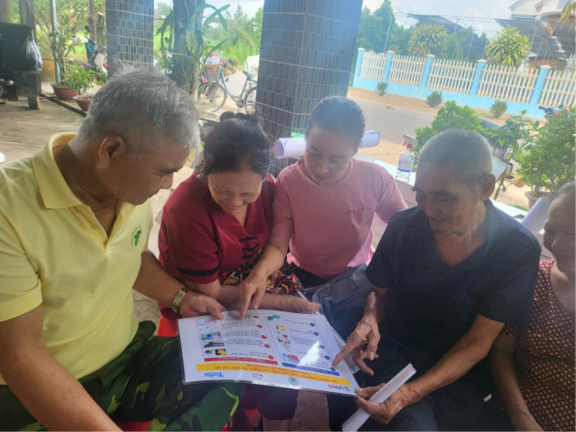Wildlife farms in three at-risk districts in Viet Nam received critical preventive wildlife healthcare training in March 2024. This effort was led by the STOP Spillover Viet Nam country team, the country team lead Ha Nguyen Thi Ngoc, on-site experts Dr. Jeffrey Mariner and Dr. Bruno Ghersi, and remote experts Dr. Tristan Burgess and Dr. Felicia Nutter.
In Viet Nam, legal wildlife farming, particularly with civets, sambar deer, porcupines, and bamboo rats, is an unregulated industry in which farming practices create risks for the emergence and inter-species transmission of zoonotic viruses. Wildlife farming is a practice that is largely learned at the community level and formal veterinary services are rarely provided to the animals. Moreover, while veterinarians are familiar with how to identify and treat diseases in domestic livestock, most veterinarians require more training and experience to practice veterinary medicine with wildlife species. The lack of regulation and insufficient provision of veterinary services on wildlife farms elevates the risk of spillover in these settings.
STOP Spillover team members determined that providing training to groups working with farmed wildlife in districts with the highest spillover risk – including Vinh Cuu, Dinh Quan, and Tan Phu districts in Dong Nai province – would help reduce the risk of zoonotic pathogen spillover and spread. Training in preventive wildlife healthcare, treatment, and management of common diseases in the targeted species was provided in three courses, and implemented in two separate sections which targeted specific participant groups. The courses provided participants with knowledge and skills necessary to identify the most common clinical signs of diseases observed in civets, sambar deer, porcupines, and bamboo rats, as well as the ability to administer basic diagnostic services and appropriate, first-line clinical and preventive care.


The first course section was designed for veterinarians, agricultural officers, and forest rangers from provincial and district levels, with 4 female and 31 male participants completing the five-day course. The second section of the course was designed for Community Animal Health Workers and wildlife farmers, and spanned eight days. This course section was completed by a total of 47 participants from Tan Phu and Dinh Quan Districts, and by 40 participants from Vinh Cuu District.
The head of the Tan Phu animal health station, Dr. Le Tan Viet shared his thoughts on the experience: “This is a very productive training that I have attended,” he said. “I learned lots from lectures from trainers from the practical session on the farm on how to handle civets and bamboo rats, as well as how to examine and inject them. I will use the knowledge to share with my other colleagues and apply in my current work.”
Following these successful training workshop sections, our next steps include incorporating inputs from veterinarians, farmers, and other partners to finalize the two handbooks on wild animal healthcare for veterinarians and farmers, providing mentorship and supervision for community animal health workers, and linking to the development and implementation of biosafety and biosecurity certification for farmed wildlife and wildlife products.
STOP Spillover’s training on Preventive Wildlife Healthcare, Treatment, and Management of Common Diseases in Targeted Wildlife was a major step forward in developing a skilled workforce to address the gap in veterinary services for farmed wildlife in Viet Nam.